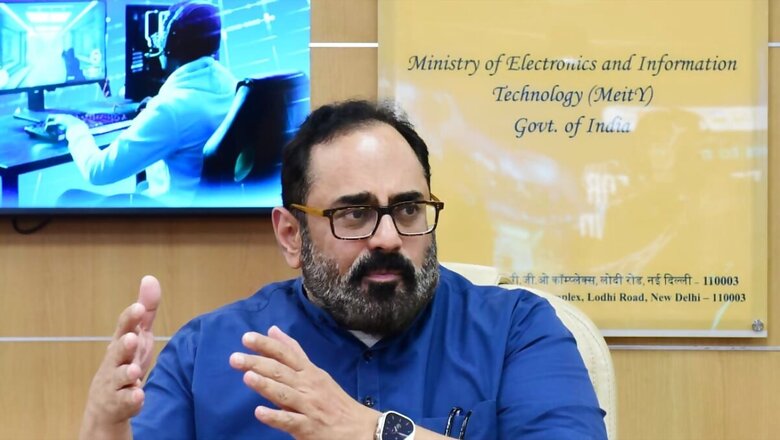
views
Identifying misinformation as a serious threat, Union Minister of State for Electronics and Information Technology Rajeev Chandrasekhar on Friday stood firm on the new rules to notify a fact-checker that will identify false or misleading content related to the government on social media platforms.
“Misinformation impacts individuals, markets, economies, enterprises and governments. This is increasingly creating violence, law and order situations and incitement,” the minister said in a live Twitter session.
“We have seen examples. In 2020, we have taken down over 1,100 accounts, linked to the Pakistani ISI, that were running misinformation against India and the government. And even recently after the Bhatinda incident, we saw calibrated efforts from Pakistan-based accounts spreading all types of things on social media,” he said.
The minister further said that misinformation against the government needs to be addressed and since the misleading information is related to the government, the fact-checking unit needed to be linked to or within the government that will have access to all details.
“The unit, that understands government information and has access to it, will assist intermediaries in a way by flagging what is false in a transparent and consistent way,” said MoS Chandrasekhar.
Under the new rules, internet giants like Google, Facebook and Twitter may lose protection under safe harbour if they fail to remove content identified by the government-notified fact-checker as false or misleading information.
Internet and social media platforms, such as Google, Facebook, Twitter and internet service providers etc, fall within the ambit of an intermediary.
The safe harbour clause protects intermediaries from legal action on them for any objectionable content posted online by their users.
The government’s fact-check unit will essentially flag misinformation, Chandrasekhar said. “Beyond this, the government hasn’t given itself any other power to take down,” he added.
The minister, however, highlighted Section 69 of the IT Act, under which content-blocking orders may be issued by the government to internet intermediaries, telecom service providers, web hosting services, search engines, and online marketplaces.
“There is a real effort now by countries against misinformation. The world has woken up to the threat. The measures taken by the government are consistent, without compromising the Constitution and values, to make their platforms safe and trusted and what content they carry and should not,” the minister stated.
If the fact-checking unit informs a platform that certain content is misleading or fake, and despite that, the platform still allows the content, the department that flagged it will challenge the platform in court and adjudicate the dispute.
“If intermediaries don’t follow the rules, the consequence they will face… is that they will lose safe harbour status, given under Section 79 of IT Act. Once these companies lose that, they will be subject to any case that is filed against them- criminal, civil, financial penalties from government departments, police, or an individual,” the MoS noted.
Read all the Latest India News here




















Comments
0 comment